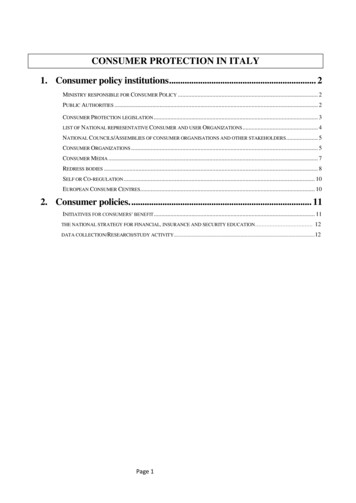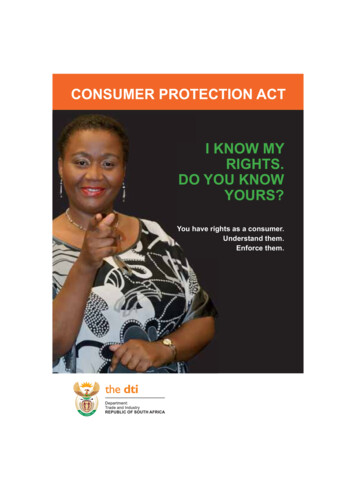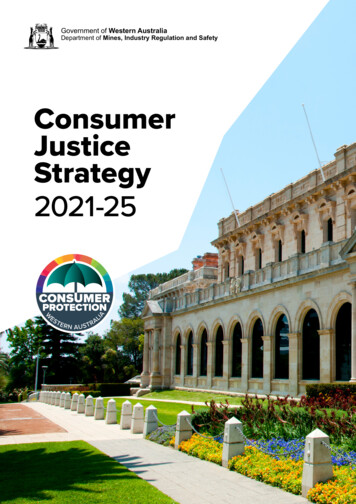![Chapter 11. Consumer Protection. [Note] - Montgomery County, Maryland](/img/40/chap11.jpg)
Transcription
Montgomery County CodeChapter 11. Consumer Protection.[Note]§ 11-1. Definitions.§ 11-2. Office of Consumer Protection.§ 11-3. Advisory Committee on Consumer Protection.§ 11-4. Deceptive trade practices.§ 11-4A. Unfair trade practices - Internet Access Service.§ 11-4B. Domestic Workers - Written Employment Contracts.§ 11-5. Exemptions from chapter.§ 11-6. Filing complaints.§ 11-6A. Discriminatory, predatory, or abusive lending practices.§ 11-7. Procedures.§ 11-8. Conciliation Procedures.§ 11-9. Enforcement of summonses and subpoenas.§ 11-10. Administrative hearing.§ 11-11. Enforcement and penalties.Sec. 11-1. Definitions.In this Chapter, the following words and phrases have the following meanings:Consumer: A purchaser, lessee, or recipient, or prospective purchaser, lessee or recipient of consumergoods or services, including a co-obligor or surety.Consumer goods or services: Real estate, goods, services, credit, debts, or obligations that are primarily forpersonal, household, family or agricultural purposes.Director or Executive Director: The Director of the Office of Consumer Protection, or the Director's
designee.Merchant: Any person who offers or makes available to consumers, either directly or indirectly, consumergoods or services.Office: The Office of Consumer Protection.Person: An individual, proprietor, partnership, corporation, firm, cooperative, association, or any othergroup of individuals or legal entity, however organized.Predatory or abusive lending practice: Any representation or marketing practice that is intended tomisrepresent terms or mislead a consumer about the value of financing or buying real estate, consumer goods, orconsumer services.**Editor’s note—The predatory or abusive lending practice definition was added by 2005 L.M.C., ch. 29, §3 (Bill 36-04). However, in American Financial Services, et. al. v. Montgomery County, (Civil Action No.269105), the Court declared Bill 36-04 “null and void” by order dated 11/30/06.Real estate: Any leasehold or other tangible interest in residential real property, dwelling, building, or otherstructure located on residential real property, including a condominium unit. (1972 L.M.C., ch. 11, § 1; 1974L.M.C., ch. 13, § 1; FY 1991 L.M.C., ch. 9, § 1; 1996 L.M.C., ch. 13, § 1; 2005 L.M.C., ch. 26, § 1; 2005L.M.C., ch. 29, § 3; 2006 L.M.C., ch. 7, § 1.)Editor's note—The above section is discussed in Fosler v. Panoramic Design, Ltd., 376 Md. 118, 829A.2d 271 (2003). The above section is described in Syndicated Publications, Inc. v. Montgomery County, 921F.Supp. 1442 (D.Md. 1996).2005 L.M.C., ch. 26, §§ 2 and 3, state:Sec. 2. Regulations. A regulation which implements a function transferred to the Office of ConsumerProtection by this Act continues in effect until otherwise amended or repealed, but any reference to anypredecessor department or office must be treated as referring to the Office of Consumer Protection.Sec. 3. Transition. This act does not invalidate or affect any action taken by the Department of Housing andCommunity Affairs before this Act took effect. Any responsibility or right granted by law, regulation, contract,or other document, and which is associated with a function transferred by this Act from the Department ofHousing and Community Affairs, is transferred to the Office of Consumer Protection.Sec. 11-2. Office of Consumer Protection.(a)Established. The Office of Consumer Protection is a department of County government.(b)Authority. The Office may:(1) receive and investigate complaints and initiate its own investigation of deceptive, unfair, orunconscionable trade practices against consumers, hold hearings, compel the attendance of witnesses, administeroaths, take the testimony of any person under oath and require the production of any evidence relating to any
matter under investigation or in question by the Office;(2) issue summonses and subpoenas to compel the attendance of witnesses and the production ofdocuments, papers, books, records, and other evidence in any matter to which this Chapter applies;(3) issue cease and desist orders and bring enforcement actions regarding any trade practice thatviolates this Chapter;(4) report to any appropriate government agency with jurisdiction over real estate transactions orconsumer protection matters any information concerning violation of any consumer protection law;(5) communicate the interests of consumers and merchants before administrative and regulatoryagencies and legislative bodies to ensure that both are adequately represented;(6) assist, advise, and cooperate with the Better Business Bureau and local, state, and federal agenciesand officials to protect and promote the interests of County consumers;(7) assist, develop, and conduct programs of consumer education and information through publichearings, meetings, publications, or other materials prepared for distribution to County consumers;(8) encourage local business and industry to maintain high standards of honesty, fair business practices,and public responsibility in the production, promotion, and sale of consumer goods or services;(9)protect and promote the welfare of County consumers and merchants;(10) report annually on the number, nature, and disposition of complaints filed with the Office. Theannual report must include any recommendations made by the Advisory Committee on Consumer Protection;(11)adopt regulations under method (2) to implement this Chapter;(12)operate a voluntary arbitration program;(13) enforce laws pertaining to motor vehicle repair, electrical appliances, secondhand personalproperty, and any other law that the Office is assigned to enforce; and(14) undertake activities and establish procedures to identify, and assist consumers with respect to, anydiscriminatory, predatory, or abusive lending practices.**Editor’s note—Paragraph (14), formerly paragraph (n), was added by 2005 L.M.C., ch. 29, § 3 (Bill 3604). However, in American Financial Services, et. al. v. Montgomery County, (Civil Action No. 269105), theCourt declared Bill 36-04 “null and void” by order dated 11/30/06.(c)Energy and environmental advocacy.(1) The Office, after consulting appropriate County departments, must advocate for the County’sinterest in obtaining the lowest possible rates consistent with environmental stewardship, including the County’sclimate change objectives, for gas, electricity, and other energy sources by participating in matters pendingbefore appropriate federal and state agencies, including intervening and filing comments in those matters.
(2) The Office may employ consultants and technical advisors as necessary to implement this subsectionin accordance with funds appropriated in the County budget.(3) By September 1 of each year, the Office must report to the County Executive and County Councilon the actions that the Office has taken in the preceding fiscal year to implement this subsection.(1972 L.M.C., ch. 11, § 1; 1974 L.M.C., ch. 13, § 2; 1979 L.M.C., ch. 16, § 2; 1980 L.M.C., ch. 21, § 12;1984 L.M.C., ch. 24, § 13; 1984 L.M.C., ch. 27, § 12; 1986 L.M.C., ch. 37, § 3; 1996 L.M.C., ch. 13, § 1;2005 L.M.C., ch. 26, § 1; 2005 L.M.C., ch. 29, § 3; 2006 L.M.C., ch. 7, § 1; 2007 L.M.C, ch. 5, § 1; 2008L.M.C., ch. 12, § 1.)Editor's note—The above section is discussed in Fosler v. Panoramic Design, Ltd., 376 Md. 118, 829A.2d 271 (2003). The above section is described in Syndicated Publications, Inc. v. Montgomery County, 921F.Supp. 1442 (D.Md. 1996).2007 L.M.C., ch. 5, § 2, states: Affect on incumbents. If on the effective date of this Act [May 28, 2007] amerit system employee occupies a position which this Act converts to a non-merit position:(a) that employee retains all merit system rights; and(b) the position does not become a non-merit position until that employee leaves the position through transfer,promotion, demotion, retirement, or other separation from service.2005 L.M.C., ch. 26, §§ 2 and 3, state:Sec. 2. Regulations. A regulation which implements a function transferred to the Office of ConsumerProtection by this Act continues in effect until otherwise amended or repealed, but any reference to anypredecessor department or office must be treated as referring to the Office of Consumer Protection.Sec. 3. Transition. This act does not invalidate or affect any action taken by the Department of Housing andCommunity Affairs before this Act took effect. Any responsibility or right granted by law, regulation, contract,or other document, and which is associated with a function transferred by this Act from the Department ofHousing and Community Affairs, is transferred to the Office of Consumer Protection.Cross reference-Office of consumer affairs established, § 1A-203(a).Sec. 11-3. Advisory Committee on Consumer Protection.(a) Creation and composition; appointment of members; chair. There is an Advisory Committee onConsumer Protection, which consists of 9 persons appointed by the County Executive, subject to confirmationby the County Council. The membership must reflect a cross-section of consumer and business interests. At least2 members must be members of the Better Business Bureau or of another County-wide association ofmerchants. At least 1 member must be a member of the Community Action Board, and a second member mustbe recommended by the Community Action Board. If, after written notice to these groups, no application isreceived from a member of these groups, and no recommendation is received from one of these groups, theExecutive may appoint a person from the public-at-large. Each member serves a 3 year term. A memberappointed to fill a vacancy serves the rest of the unexpired term. Each member continues in office until a
successor is appointed and confirmed. The Committee must elect one member as chair and another member asvice chair, each to serve in that capacity at the pleasure of the Committee, and such other officers as itdetermines.(b)Compensation. Members of the Committee receive no compensation for their services.(c) Meetings; services; reports. The Committee must meet when required by the chair, but no less thanonce each month. The Committee must submit an annual report to the Executive and Council.(d) Powers and duties. The Committee must advise the Office in carrying out its duties and functionsunder this Chapter, and may hold public hearings on any topic related to Consumer Protection.(1972 L.M.C.,ch. 11, § 1; 1977 L.M.C., ch. 28, § 5; 1978 L.M.C., ch.19, § 1; FY 1991 L.M.C., ch. 9, § 1; 1996 L.M.C.,ch. 13, § 1; 2005 L.M.C., ch. 26, § 1; 2006 L.M.C., ch. 7, § 1.)Editor's note—The above section is discussed in Fosler v. Panoramic Design, Ltd., 376 Md. 118, 829A.2d 271 (2003).2005 L.M.C., ch. 26, §§ 2 and 3, state:Sec. 2. Regulations. A regulation which implements a function transferred to the Office of ConsumerProtection by this Act continues in effect until otherwise amended or repealed, but any reference to anypredecessor department or office must be treated as referring to the Office of Consumer Protection.Sec. 3. Transition. This act does not invalidate or affect any action taken by the Department of Housing andCommunity Affairs before this Act took effect. Any responsibility or right granted by law, regulation, contract,or other document, and which is associated with a function transferred by this Act from the Department ofHousing and Community Affairs, is transferred to the Office of Consumer Protection.Cross reference-Boards and commissions generally, § 2-141 et seq.Sec. 11-4. Deceptive trade practices.A merchant must not engage in a deceptive, unfair, or unconscionable trade practice, whether or not anyspecific consumer has, in fact, been misled, deceived, or damaged thereby. Deceptive, unfair, or unconscionabletrade practices include:(a) a representation that consumer goods or services have sponsorship, approval, accessories,characteristics, ingredients, uses, benefits, or quantities that they do not have;(b) a representation that the merchant has a sponsorship, approval, corporation indication, status,affiliation, or connection that the merchant does not have;(c) a representation that consumer goods are original or new if they are deteriorated, altered,reconditioned, reclaimed, or secondhand;(d) a representation that consumer goods or services are of a particular standard, quality, grade, style, ormodel, if they are of another;
(e)a misrepresentation as to a material fact that has a tendency to mislead;(f)a failure to state a material fact if the failure deceives or tends to deceive;(g) disparaging the consumer goods or services, or business of another by false or misleadingrepresentations of material facts;(h) advertising or offering consumer goods or services without the intent or authority to sell them asadvertised or offered;(i) advertising or offering consumer goods or services with intent not to supply reasonably expected publicdemand, unless the advertisement or offer discloses a limit of quantity or other qualifying condition;(j) making false or misleading representations of fact concerning the reasons for, existence of, or amountsof price reductions; or the price in comparison to the price of competitors or one's own price at a past or futuretime;(k)falsely stating that consumer goods or services, replacements, or repairs are needed;(l) falsely stating the reasons for offering or supplying consumer goods or services at sale or discountprices;(m)harassment of or threat to any person with regard to any act other than legal process;(n) any deception, fraud, false pretense, false premise, misrepresentation, or concealment, suppression, oromission of any material fact with the intent that consumers rely on the concealment, suppression, or omission, inconnection with any consumer goods or services;(o) any false, falsely disparaging or misleading oral or written statement, visual description or otherrepresentation of any kind that has the capacity, tendency, or effect of deceiving or misleading consumers and ismade in connection with any consumer goods or services;(p) any representation that an agreement confers or limits rights, remedies, or obligations that it does notconfer or limit, or that are prohibited by law;(q)failure of any merchant to comply with a warranty;(r) failure to provide a written estimate of repairs, alterations, modifications, or services when requested bya consumer and the later repair, alteration, modification, or servicing of any item without first tendering a writtenestimate;(s) performing repairs, alterations, modifications, or services exceeding by 25 percent or more the pricequoted in a written estimate without prior approval of the consumer;(t) imposing or demanding a labor or service charge without notifying the consumer of the charge beforedismantling, disassembling or otherwise altering a consumer good;(u) failing to supply a consumer with a copy of a contract, lease, promissory note, trust agreement, orevidence of indebtedness when the consumer executes the document;
(v) making or enforcing unconscionable contract terms. In applying this subsection, the following factorsmay be considered:(1) knowledge by the merchant when a credit sale or loan is consummated that there was noreasonable probability of payment in full of the obligation by the consumer;(2) knowledge by the merchant at the time of the sale or lease of the consumer’s inability to receivesubstantial benefits from the consumer good or service sold or leased;(3) gross disparity between the price of consumer goods or services sold or leased and the value of theconsumer goods or services measured by the price at which similar consumer goods or services are readilyobtainable by like buyers or lessees;(4) the fact that the merchant contracted for or received separate charges for insurance with respect tocredit sales with the effect of making the sales, considered as a whole, unconscionable;(5) the fact that the merchant has knowingly taken advantage of the inability of a consumer reasonablyto protect his or her interests because of physical or mental infirmities, ignorance, illiteracy, inability to understandthe language of the agreement, or similar factors;(w) replacing any part in an electrical or mechanical apparatus, appliance, chattel, or other consumer goodwhen the part was not defective, unless expressly requested by the consumer;(x)falsely stating or representing that any repair, alteration, or service was performed;(y)taking payment for goods or services without delivering the goods or performing the services; or(z) practicing, or in any way engaging in, any trade, occupation, or profession without a license,registration, certificate, or other evidence of training or experience required by law. (1972 L.M.C., ch. 11, § 1;1976 L.M.C., ch. 21, § 1; 2006 L.M.C., ch. 7, § 1.)Editor’s note—The above section is cited in Nefedro v. Montgomery County, 414 Md. 585, 996 A.2d 850(2010). The above section is discussed in Fosler v. Panoramic Design, Ltd., 376 Md. 118, 829 A.2d 271(2003). The above section is quoted, interpreted and held valid in Syndicated Publications, Inc. v. MontgomeryCounty, 921 F.Supp. 1442 (D.Md. 1996).Editor’s note—Former Section 11-4A, unfair trade practices - future service contracts, which was derivedfrom 1993 L.M.C., ch. 25, § 1 and 1995 L.M.C., ch. 9, § 1, was repealed by 2006 L.M.C., ch. 7, § 1. Thatsection is discussed in Fosler v. Panoramic Design, Ltd., 376 Md. 118, 829 A.2d 271 (2003).Sec. 11-4A. Unfair trade practices - Internet Access Services.(a) A merchant must not engage in any unfair trade practice in the provision of internet access service usingany facility in its control that is located in a County right-of-way.(b)An unfair trade practice includes the refusal or failure of a merchant to:
(1)provide any internet access service for which a consumer has paid;(2)properly install any facility required to provide internet access service to a consumer; or(3)promptly and effectively respond to a consumer complaint concerning internet access service.(c) Internet access service means the provision of internet access to a consumer over any facilitycontrolled by a merchant that is located in a County right-of-way.(d) The County Executive must issue regulations under Method (2) that establish minimum internet accessservice standards that a merchant must comply with.(e) (1) The Department of Technology Services may receive an investigate complaints of violations ofthis Section. The Cable Compliance Commission may adjudicate violations of this Section, as provided inSection 8A-31.(2) The Department may also refer any complaint received under this Section to the Office ofConsumer Protection for investigation and enforcement. To enforce any complaint referred to it under thisSection, the Office of Consumer Protection may pursue any remedy for violations of this Chapter. (2006L.M.C., ch. 36, § 1.)Sec. 11-4B. Domestic Workers - Written Employment Contracts.(a)Legislative findings.(1)limited to:Domestic workers are entitled to legal protections under State employment laws including, but not(A)minimum wage;(B)payment for all hours worked;(C)payment of wages in United States dollars twice per month;(D)week; and(E)overtime pay of 1.5 times the regular wage rate for hours worked in excess of 40 hours perworker’s compensation.(2) The County Council Committee on Health and Human Services sponsored a study of domesticworkers in the County which was released on May 10, 2006. The study found that:(A) domestic workers in the County have limited access to information concerning the legalprotections available to them;(B)many domestic workers in the County are paid less than the minimum wage;(C)many domestic workers in the County do not receive overtime pay for work in excess of 40
hours per week;(D) few domestic workers in the County have written employment contracts setting forth the termsand conditions of their employment;(E) domestic workers in the County who live in their employer’s residence are generally paid lessand work longer hours than domestic workers who do not live at their employer’s residence; and(F) domestic workers in the County are often isolated and unable to experience the peer to peernetworking that is necessary for organized labor movements.(3) The Council finds that legislation is needed to ensure that domestic workers in the County receivethe legal protections they are entitled to under State law, as well as the right to a written employment contractgoverning the terms and conditions of employment.(b)Definitions. In this Section, the following words have the meaning indicated:Au pair means an individual who performs childcare services pursuant to the program administered by theState Department of the United States in a private home of the person by whom she is employed.Disclosure statement means a document confirming that:(1) an employer presented a written employment contract signed by the employer to a domestic workerafter offering to negotiate the terms and conditions of employment; and(2)the worker voluntarily chose not to sign the contract.Domestic service means, when primarily performed in a home of a recipient of the service located in theCounty:(1)caring for a child;(2)serving as a companion to a sick, convalescing, disabled, or elderly individual;(3)housekeeping;(4)cooking;(5)cleaning; or(6)laundry.Domestic worker means an individual who performs domestic service for wages in the County.Domestic worker does not include:(1) a registered nurse, licensed practical nurse, or certified nursing assistant who is licensed or certifiedby the Maryland Board of Nursing;(2)a child, parent, spouse, or other member of the immediate family of the employer;
(3)an au pair; or(4) an individual who primarily serves as a companion to a disabled or elderly individual who is unableto care for himself or herself, and who is not employed by an agency.Elderly means an individual who is 67 years old or older.Employment contract means a written agreement signed by a domestic worker and an employer whichgoverns the terms and conditions of employment.Employer means a person who hires a domestic worker to perform at least 20 hours of work each weekduring any period that is 30 days or longer. An employer may include an agency that hires a domestic worker toperform domestic service in the home of the recipient of the service.Hours of work means the time during any 7-day period that a domestic worker is on duty.Paid time off means time for which a domestic worker receives wages without working, including anyholiday, vacation, or sick leave.Unpaid time off means time during the normal hours of work when the domestic worker may be absentwithout receiving wages.Wages means any compensation which a domestic worker receives, including any bonus, commission,fringe benefit, or other payment.(c) Employment Contract. In order to employ a domestic worker, the employer must obtain either awritten employment contract signed by both the employer and the domestic worker or a disclosure statementsigned by the domestic worker. Each employer must present a proposed written employment contract to adomestic worker and offer to negotiate the terms and conditions of employment. Once a final contract is agreedupon, the employer must sign and give the domestic worker a copy. If the domestic worker is employer by anagency, the employment contract must be between the agency and the employee. Each written employmentcontract must specify the following terms and conditions of employment:(1)days and hours of work;(2)wages;(3)paid time off;(4)unpaid time off;(5)frequency of payment of wages;(6)deductions from wages;(7)eligibility for and calculation of overtime wages;(8)duties;
(9) right of the employer, if any, to require the domestic worker to perform duties that are not specifiedin the contract;(10)living accommodations provided by the employer, if any, including deductions for rent;(11)meals provided by the employer, if any, including deductions for meals;(12)time allowed for breaks and meals during work hours;(13)required notice, if any, before the employer or domestic worker terminates the contract;(14)period;severance wages, if any, if the employer terminates the contract before the end of the contract(15)contract period;(16)reimbursement for work-related expenses; and(17)notice of employment rights under State law.(d) Living accommodation. Any dwelling unit that includes living accommodations for a domestic workermust meet all minimum standards for a dwelling unit in Chapter 26 and the worker must have:(1)a private room for sleeping with a door that can be locked;(2)reasonable access to a kitchen;(3)reasonable access to a bathroom;(4)reasonable access to laundry facilities.(e) Model Contract. The Director, after consulting with the Commission for Women, must draft andmake available a model employment contract and a model disclosure statement which an employer may use tocomply with this Section. The model contract and the model disclosure statement must be published in English,French, and Spanish.(f)Retaliation. An employer must not retaliate against a domestic worker who:(1)requests a written contract required under this Section;(2)seeks to enforce the terms of a written employment contract; or(3) files a complaint or testifies, assists, or participates in any manner in an investigation, proceeding, orhearing to enforce this Section.(g) Complaint. If an employer does not comply with this Section, a domestic worker may file a complaintunder Section 11-6. (2008 L.M.C., ch. 27, § 1.)
Sec. 11-5. Exemptions from chapter.This chapter does not apply to:(a) other than practicing or acting without a license, professional services rendered by any certified publicaccountants, architects, clergymen, professional engineers, lawyers, veterinarians, insurance agents and brokerslicensed by the state, Christian Science practitioners, land surveyors and property line surveyors, optometrists,physical therapists, podiatrists, psychologists, and medical and dental practitioners, engaging in their respectiveprofessional activities;(b) any television or radio broadcasting station or any publisher or printer of a newspaper, magazine, orother form of printed advertising who broadcasts, publishes, or prints an advertisement which violates thisChapter, except insofar as the station or publisher or printer engages in a deceptive or unconscionable practice inthe sale or offering for sale of its own goods or services or knows that the advertising violates this Chapter;(c) public utility companies to the extent that the company’s services and operations are regulated by thestate Public Service Commission;(d) defective tenancies or other complaints concerning any condition in rental housing which arises out of alandlord-tenant relationship and constitutes a violation of Chapter 29; and(e) the sale of real estate, directly or indirectly, by any owner-occupant of the real estate, except asprovided in Section 40-14. (1972 L.M.C., ch. 11, § 1; 1974 L.M.C., ch. 13, § 3; 2006 L.M.C., ch. 7, § 1;2007 L.M.C., ch. 22, § 2.)Editor's note—In Holiday Universal, Inc. v. Montgomery County, 377 Md. 305, 833 A.2d 518 (2003), theCourt held that Montg. Co. Code § 11-4A did not meet the requirements for a local law and, therefore, wasinvalid. The above section is discussed in Fosler v. Panoramic Design, Ltd., 376 Md. 118, 829 A.2d 271(2003).Sec. 11-6. Filing complaints.(a)Definition. In this section “domestic worker” has the meaning stated in Section 11-4B.(b)Complaint. Any consumer or domestic worker may file a written complaint with the Director.(c) Contents. A complaint should state the name and address of the person alleged to have committed aviolation of this Chapter, describe the violation, and provide any other information that the Office requires.However, the Director may act on a complaint that is not complete. The Director may investigate any violationof and enforce this Chapter without receiving a complaint.(d) Referral to Department of Housing and Community Affairs. The Director must refer a complaintfrom a domestic worker alleging living accommodations that do not comply with Section 11-4B(d) to theDepartment of Housing and Community Affairs for investigation and enforcement.(e) Referral to the Office of Human Rights. The Director must refer a complaint from a domesticworker alleging a discriminatory employment practice to the Office of Human Rights.
(f) Referral to the Commission for Women. The Director may refer a domestic worker to theCommission for Women Counseling and Career Center for additional assistance if the Director determines thatthe services offered there would benefit the worker. (1972 L.M.C., ch. 11, § 1; 1993 L.M.C., ch. 25, § 1;1996 L.M.C., ch. 13, § 1; 2006 L.M.C., ch. 7, § 1; 2008 L.M.C., ch. 27, § 2.)Editor’s note—The above section is discussed in Fosler v. Panoramic Design, Ltd., 376 Md. 118, 829A.2d 271 (2003).2005 L.M.C., ch. 26, §§ 2 and 3, state:Sec. 2. Regulations. A regulation which implements a function transferred to the Office of ConsumerProtection by this Act continues in effect until otherwise amended or repealed, but any reference to anypredecessor department or office must be treated as referring to the Office of Consumer Protection.Sec. 3. Transition. This act does not invalidate or affect any action taken by the Department of Housing andCommunity Affairs before this Act took effect. Any responsibility or right granted by law, regulation, contract,or other document, and which is associated with a function transferred by this Act from the Department ofHousing and Community Affairs, is transferred to the Office of Consumer Protection.Sec. 11-6A. Discriminatory, predatory, or abusive lending practices.*A consumer who is concerned about a potentially discriminatory, predatory, or abusive lending practice in theCounty may file a written request for assistance with the Officer of Consumer P
Housing and Community Affairs, is transferred to the Office of Consumer Protection. Sec. 11-2. Office of Consumer Protection. (a) Established. The Office of Consumer Protection is a department of County government. (b) Authority. The Office may: (1) receive and investigate complaints and initiate its own investigation of deceptive, unfair, or










